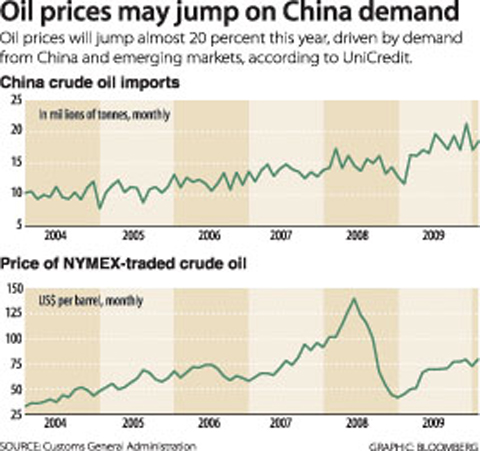Commodities mainly fell this week as traders digested an EU plan to tackle the Greek debt crisis, alongside news of moderately weaker economic growth in the US, a key consumer.
“Most commodity markets [were] lower, weighed primarily by broader market concerns,” Barclays Capital analysts said in a research note to clients.
“Lingering concerns on sovereign risk in the euro area and a smattering of mixed US macro-economic data have all affected the trajectory of commodity price movements,” they added.

OIL: Prices fell at the start of the week, before attempting a brief recovery as the US dollar weakened, but drifted lower on Friday as traders mulled the Greek rescue deal and the US economic growth outlook.
Oil had fallen earlier in the week as traders also tracked US demand worries as a government inventory report showed a jump in American crude inventories.
The US government’s Department of Energy said in its weekly inventory report on Wednesday that crude oil inventories rose 7.2 million barrels last week, confounding expectations of an increase of 1.7 million barrels.
By late on Friday on the New York Mercantile Exchange, Texas light sweet crude for delivery in May sank to US$79.82 compared with US$80.29 a week earlier for the expired April contract.
On London’s IntercontinentalExchange, Brent North Sea crude for May delivery dipped to US$79.05 from US$79.66 a week earlier.
PRECIOUS METALS: The prices of all precious metals declined.
By Friday on the London Bullion Market, gold eased to US$1,096 an ounce from US$1,105 the previous week.
Silver dipped to US$16.85 an ounce from 17.31.
On the London Platinum and Palladium Market, platinum edged down to US$1,596 an ounce from US$1,617.
Palladium fell to US$458 an ounce from US$476.
BASE METALS: Base or industrial metals diverged, despite growing hopes of a recovery in demand.
“There is a growing body of evidence to suggest that the biggest ever recovery in global base metals demand is taking shape,” Barclays Capital analysts said.
“Skepticism over the sustainability of this recovery and, in some cases, total blind-sidedness over any recovery at all, means that prices have yet to fully reflect what are turning into very positive demand dynamics indeed,” they said.
By Friday on the London Metal Exchange, copper for delivery in three months rose to US$7,512 a tonne from US$7,419 the previous week. Three-month aluminum dropped to US$2,230 a tonne from US$2,252.
GRAINS AND SOYA: Grains and soya prices weakened.
By Friday on the Chicago Board of Trade, maize for delivery in May dipped to US$3.57 a bushel from US$3.74 the previous week.
May-dated soyabean meal — used in animal feed — dropped to US$9.45 from US$9.61.
Wheat for May was down to US$4.66 a bushel from US$4.83.

MORE VISITORS: The Tourism Administration said that it is seeing positive prospects in its efforts to expand the tourism market in North America and Europe Taiwan has been ranked as the cheapest place in the world to travel to this year, based on a list recommended by NerdWallet. The San Francisco-based personal finance company said that Taiwan topped the list of 16 nations it chose for budget travelers because US tourists do not need visas and travelers can easily have a good meal for less than US$10. A bus ride in Taipei costs just under US$0.50, while subway rides start at US$0.60, the firm said, adding that public transportation in Taiwan is easy to navigate. The firm also called Taiwan a “food lover’s paradise,” citing inexpensive breakfast stalls

TRADE: A mandatory declaration of origin for manufactured goods bound for the US is to take effect on May 7 to block China from exploiting Taiwan’s trade channels All products manufactured in Taiwan and exported to the US must include a signed declaration of origin starting on May 7, the Bureau of Foreign Trade announced yesterday. US President Donald Trump on April 2 imposed a 32 percent tariff on imports from Taiwan, but one week later announced a 90-day pause on its implementation. However, a universal 10 percent tariff was immediately applied to most imports from around the world. On April 12, the Trump administration further exempted computers, smartphones and semiconductors from the new tariffs. In response, President William Lai’s (賴清德) administration has introduced a series of countermeasures to support affected

CROSS-STRAIT: The vast majority of Taiwanese support maintaining the ‘status quo,’ while concern is rising about Beijing’s influence operations More than eight out of 10 Taiwanese reject Beijing’s “one country, two systems” framework for cross-strait relations, according to a survey released by the Mainland Affairs Council (MAC) on Thursday. The MAC’s latest quarterly survey found that 84.4 percent of respondents opposed Beijing’s “one country, two systems” formula for handling cross-strait relations — a figure consistent with past polling. Over the past three years, opposition to the framework has remained high, ranging from a low of 83.6 percent in April 2023 to a peak of 89.6 percent in April last year. In the most recent poll, 82.5 percent also rejected China’s

PLUGGING HOLES: The amendments would bring the legislation in line with systems found in other countries such as Japan and the US, Legislator Chen Kuan-ting said Democratic Progressive Party (DPP) Legislator Chen Kuan-ting (陳冠廷) has proposed amending national security legislation amid a spate of espionage cases. Potential gaps in security vetting procedures for personnel with access to sensitive information prompted him to propose the amendments, which would introduce changes to Article 14 of the Classified National Security Information Protection Act (國家機密保護法), Chen said yesterday. The proposal, which aims to enhance interagency vetting procedures and reduce the risk of classified information leaks, would establish a comprehensive security clearance system in Taiwan, he said. The amendment would require character and loyalty checks for civil servants and intelligence personnel prior to